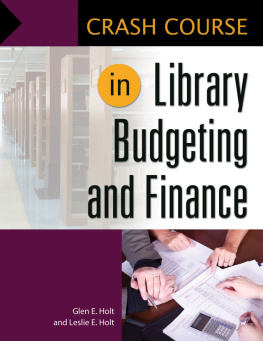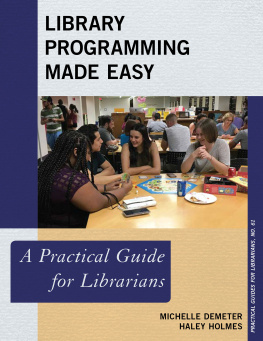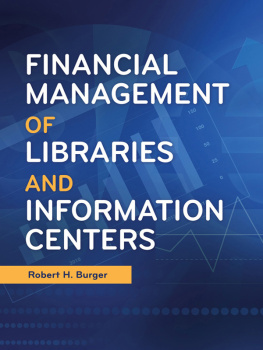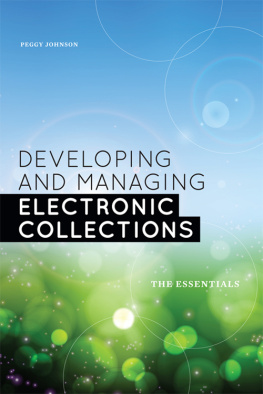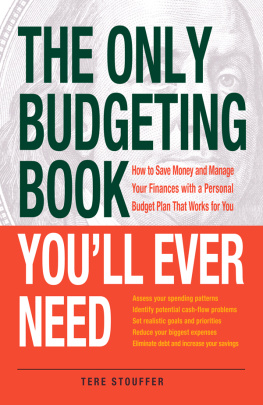Crash Course in Library Budgeting and Finance
Recent Titles in Libraries Unlimited
Crash Course Series
Crash Course in Services for Seniors
Ann Roberts and Stephanie G. Bauman
Crash Course in Strategic Planning
Stephen A. Matthews and Kimberly D. Matthews
Crash Course in Gaming
Suellen S. Adams
Crash Course in Dealing with Difficult Library Customers
Shelley E. Mosley, Dennis C. Tucker, and Sandra Van Winkle
Crash Course in Children's Services, Second Edition
Penny Peck
Crash Course in Collection Development, Second Edition
Wayne Disher
Crash Course in Marketing for Libraries, Second Edition
Susan W. Alman and Sara Gillespie Swanson
Crash Course in Readers' Advisory
Cynthia Orr
Crash Course in Storytime Fundamentals, Second Edition
Penny Peck
Crash Course in Basic Cataloging with RDA
Heather Lea Moulaison and Raegan Wiechert
Crash Course in Weeding Library Collections
Francisca Goldsmith
Crash Course in Technology Planning
Christopher D. Brown
Crash Course in Library Budgeting and Finance
Glen E. Holt and Leslie Edmonds Holt
Crash Course
Copyright 2016 by Glen E. Holt and Leslie Edmonds Holt
All rights reserved. No part of this publication may be reproduced, stored in a retrieval system, or transmitted, in any form or by any means, electronic, mechanical, photocopying, recording, or otherwise, except for the inclusion of brief quotations in a review, without prior permission in writing from the publisher.
Library of Congress Cataloging-in-Publication Data
Crash Course in Library Budgeting and Finance
Library of Congress Cataloging in Publication Control Number: 2016013107
ISBN: 978-1-4408-3474-5
EISBN: 978-1-4408-3475-2
20 19 18 17 16 1 2 3 4 5
This book is also available as an eBook.
Libraries Unlimited
An Imprint of ABC-CLIO, LLC
ABC-CLIO, LLC
130 Cremona Drive, P.O. Box 1911
Santa Barbara, California 93116-1911
www.abc-clio.com
This book is printed on acid-free paper 
Manufactured in the United States of America
Contents
Section I
Introduction
Chapter
Introduction to Library Money
Money is in some respects like fire. It is a very excellent servant but a terrible master.
P. T. Barnum
This book is a practical guide to library finance and budgeting. It is written by two library practitioners for other library practitioners. The best way for you to study the material in this book is to ask yourself what you want to do in library work.
We begin with a question:
Are you currently trying to be an effective library financial manager?
Are you attempting to move up from line staff to middle and upper management where you will have to handle budgeting and financial issues if you have not done so already?
Are you a beginning librarian who needs to make good decisions about collections, programs, services, or staff, that is, do you have to work within a budget allocation and spend for impact?
If you are a library practitioner professional (or an aspiring practitioner), then we have tried to organize this book for you. Knowledge of library budgets and finance will help you make the library's work effective and at the same time help you individually do your job better no matter what your position title or type of library.
To sum up, this is a book about how professionals use money to shape all kinds of libraries not with occasional projects, but as a process of continual adaptation to changing community needs and fluctuations in financial support. Two different library historians, Matthew Battles write that adaptation always involves change. And, change always involves money. If change is to bring improvement, it must be organized and managed for impact. And, the paramount element in change management is money, whether the application of financial resources involves addition or diminution.
This need for adaptation, including rethinking finances, is especially critical just now, since it follows an extended period of budget cuts for all kinds of libraries. Lauren Barak, contributing editor of School Library Journal, reported the December 2013-January 2014 survey of school librarians and media center professionals under the theme of how school librarians were "doing more with less."
In 1993, librarian Lesley S. J. Farmer in her book, When Your Library Budget Is Almost Zero , also emphasized the significance of necessary adaptation. She told her readers that a lack of funds and staff need not stop library changes. She encouraged school librarians, small library administrators, library school staff, and large library administrators to use her book to find ideas about how to make changes in mission, evaluation, management, operations, public relations, and fundraising. In other words, Farmer is saying that librarians, particularly school librarians, need to continue adapting and changing their institutions even in bad financial times.
Librarian Elizabeth Doucett concurs with Farmer. In her 2011 book, What They Don't Teach You in Library School , she points out that (1) change and adaptation have to be constant in libraries even when the budget declines and that (2) library professional education has neglected budgeting and spending.
Within those contextual features, Doucett says that the modern professional needs to be capable of demonstrating the librarian's worth by measurement of benefits and positive impacts and its growing dependence on the technology of data and information. The ability to demonstrate benefits and impact, Doucett asserts, can be accomplished only after librarians have learned as much as possible about budgeting and finance. Doucett concludes:
Sadly, for those of us who are number phobes, data is an important part of our jobs as librarians today. The objective of this... [study of finances] isn't to teach you to love budgeting, numbers, statistics, data, and other quantified information, but rather to demonstrate how to use them effectively and accurately when necessary in your job, and to help you lose your fear and avoidance.
Doucett's quote is a perfect rationale for this book. You might not like finance and budgeting as well as you love reading your favorite novel genre, but you need to know how to make the best decisions when you and your work peers discuss financial priorities on the way to making decisions about budgeting and finance and you need to be able to make sense of the benefits and impacts of library spending.
This crash course book should help you drive along that road. And, if you master the main points in the volume, you will learn a lot about how financial resources fuel (and help you steer) library juggernauts in good times and bad.
Part of becoming familiar with the language of institutional finance is learning that even when the amount of money is deemed small, spending it is a more complex process than balancing a personal checkbook or making sure not to spend too much on personal credit cards. Librarians always work with other people's money, whether in the public or private sector. That's why librarians need to learn about audits, because library funds are audited to ensure that they have been spent according to legal requirements, agency regulations, and professional and institutional standards. To keep you out of trouble, library funds require greater protection than you give to your own spending.

